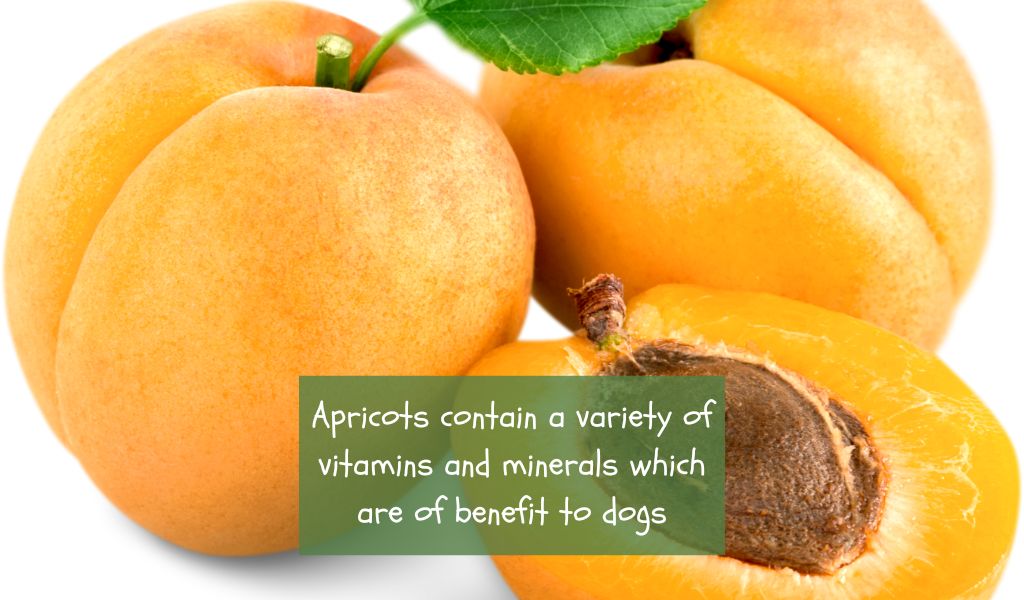As a dog owner, you want to provide your pet with a well-balanced diet that meets all their nutritional needs.
While you may be tempted to share your favourite fruits and veggies with your dog, it’s important to know which foods are safe for them to eat.
In this article, we’ll answer the question, “Can dogs eat apricots?” and explore the risks and benefits associated with this juicy fruit.
Dogs can eat apricots, but it should be done in moderation and with caution. Apricots are rich in vitamins, fibre, and potassium, which can provide several health benefits to your furry friend. However, they also contain natural sugars, a stone which is a choking hazard, and small amounts of cyanide, which can be toxic to dogs if ingested in large quantities.
What are apricots?
Apricots are a popular stone fruit that is widely enjoyed for their sweet and tangy flavour.
They are packed with essential nutrients like vitamins A and C, fibre, and potassium.
However, just because apricots are safe for human consumption doesn’t mean they are safe for dogs.
As a responsible pet owner, it’s important to be aware of the risks and benefits of feeding apricots to your furry friend.
Let’s take a closer look at the nutritional value of apricots and how they can impact your dog’s health.
Nutritional Value of Apricots
Apricots are a good source of several essential nutrients that can benefit your dog’s health.
They are low in calories and fat, making them a healthy addition to your dog’s diet in moderation.
Here are some of the nutrients found in apricots:
Vitamin A: Apricots are rich in vitamin A, which is essential for maintaining healthy skin, coat, and eyesight.
Vitamin C: Apricots are also a good source of vitamin C, which plays a key role in supporting your dog’s immune system.
Fibre: Apricots contain fibre, which can aid in digestion and help regulate your dog’s bowel movements.
Potassium: Apricots are a good source of potassium, an important mineral that helps regulate blood pressure and supports healthy muscle and nerve function.

Potential Health Benefits of Apricots for Dogs
Feeding your dog apricots in moderation can provide several health benefits.
Here are some of the potential benefits of feeding your dog apricots:
Promotes healthy digestion: The fibre found in apricots can help regulate your dog’s bowel movements and promote healthy digestion.
Supports immune system: The vitamin C found in apricots can help boost your dog’s immune system, protecting them from infections and diseases.
Good for skin and coat: The vitamin A in apricots can help maintain healthy skin and coat, reducing the risk of skin allergies and infections.
Lowers blood pressure: The potassium in apricots can help regulate blood pressure, reducing the risk of heart disease and stroke.
Risks Associated with Feeding Apricots to Dogs
While apricots offer several health benefits, they also pose certain risks to your furry friend.
Here are some of the risks associated with feeding apricots to dogs:
High sugar content: Apricots are high in natural sugars, which can lead to weight gain and other health problems if fed in excess.
Choking hazard: Apricots contain a large stone that can pose a choking hazard to dogs, especially small breeds.
Upset stomach: Eating too many apricots can cause stomach upset and diarrhea in dogs, especially those with sensitive stomachs.
Cyanide poisoning: Apricot stones contain small amounts of cyanide, which can be toxic to dogs if ingested in large quantities.
How to Safely Feed Apricots to Your Dog
If you decide to feed your dog apricots, it’s important to do so in moderation and take certain precautions to ensure their safety.
Here are some tips for safely feeding apricots to your dog:
Remove the stone: Before feeding your dog apricots, make sure to remove the pit, which can pose a choking hazard and contain small amounts of cyanide.
You can slice the fruit into small pieces or puree it to make it easier for your dog to eat.
Introduce apricots gradually: If your dog has never eaten apricots before, it’s best to introduce them gradually and in small amounts to avoid stomach upset.
Watch for signs of allergy or intolerance: Some dogs may be allergic or intolerant to apricots, which can cause symptoms like vomiting, diarrhea, or itching.
If your dog shows any of these signs, stop feeding them apricots immediately and consult with your veterinarian.
Consider your dog’s overall diet: While apricots can provide certain health benefits, they should not make up a large portion of your dog’s diet.
Make sure your dog is eating a well-balanced diet that meets all their nutritional needs.
Alternatives to Apricots for Dogs
If you’re looking for alternative fruits and veggies to add to your dog’s diet, there are plenty of options to choose from.
Here are some safe and healthy alternatives to apricots for dogs:
Apples: Apples are low in fat and packed with vitamins and antioxidants, making them a healthy snack for dogs.
Blueberries: Blueberries are a great source of fibre and antioxidants, and can be fed to dogs in moderation.
Carrots: Carrots are low in calories and high in fibre, making them a healthy treat for dogs.
Sweet potatoes: Sweet potatoes are packed with vitamins and fibre, and can be fed to dogs in moderation as a healthy alternative to high-calorie treats.
FAQs
Can apricot stones be toxic to dogs?
Yes, apricot stones contain small amounts of cyanide, which can be toxic to dogs if ingested in large quantities.
Can dogs eat dried apricots?
Dried apricots are high in sugar and can be hard for dogs to digest, so they should be fed in moderation.
Can apricots help with my dog’s digestion?
Yes, apricots contain fibre, which can aid in digestion and help regulate your dog’s bowel movements.
Can dogs be allergic to apricots?
Yes, some dogs may be allergic or intolerant to apricots, which can cause symptoms like vomiting, diarrhea, or itching.
Can apricots be beneficial for my dog’s skin and coat?
Yes, the vitamin A found in apricots can help maintain healthy skin and coat, reducing the risk of skin allergies and infections.
Conclusion and final thoughts
While apricots can provide certain health benefits, they also pose certain risks to your pet.
Feeding apricots to your dog in moderation and taking certain precautions can help ensure their safety and promote their health.
As with any new food, it’s important to introduce apricots gradually and watch for any signs of allergy or intolerance.
Consult with your veterinarian if you have any concerns about feeding apricots or any other food to your dog.




